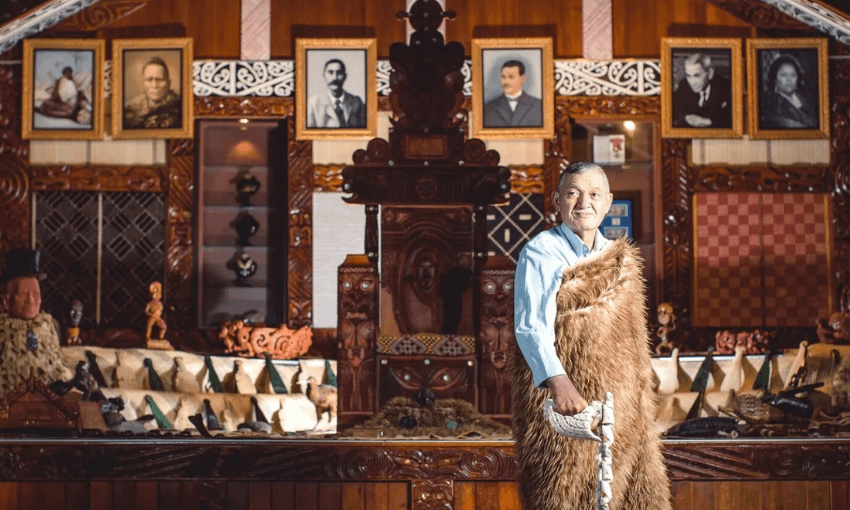In a profound loss for te ao Māori and Aotearoa, Kīngi Tuheitia Pōtatau Te Wherowhero VII has passed away at the age of 69. His death marks the end of an era for the Kīngitanga, a movement that has been a cornerstone of Māori unity and cultural identity for over 160 years.
Kīngi Tuheitia, who ascended to the throne on August 21, 2006, following the passing of his mother, Dame Te Atairangikaahu, was the seventh leader of the Kīngitanga. His reign, spanning nearly two decades, was characterised by his loyal commitment to the wellbeing of Māori, his advocacy for Māori rights, his deep dedication to the preservation of Māori culture, and unity in Aotearoa.
A legacy of advocacy and social justice
Born on April 21, 1955, as Tuheitia Paki, Kīngi Tuheitia was not initially prepared for leadership. However, Paki rose to the challenge at 51 years old with a deep sense of duty and a clear vision for his people. The reign of Tuheitia was marked by a relentless pursuit of social justice for Māori, particularly in the areas of health, education, and economic development. King Tuheitia was a tireless advocate for addressing the systemic inequities that have long affected Māori communities and he worked to ensure that the Kīngitanga remained a powerful and relevant voice in these crucial areas.
King Tuheitia was more than a political leader; he was a representative of te ao Māori to the world. While Tuheitia may have had some initial hesitancy about ascending to the throne, he grew to understand the importance of the position and its role in the protection of te reo Māori and cultural practices. As such, Tuheitia ensured the Kīngitanga worked tirelessly to assist with the preservation and revitalisation of all things te ao Māori. The annual Koroneihana celebrations became a symbol of this cultural revival, drawing thousands of Māori from across the country to celebrate their heritage and strengthen their connections.
Under his guidance, the Kīngitanga continued to be a unifying force for Māori, providing a space where diverse iwi could come together to discuss and address issues of common concern. At his most recent coronation celebrations, which concluded just last week, Tuheitia brought together several indigenous leaders from throughout the Pacific for the first time in Aotearoa. This was yet another display of the power of the Kīngitanga and the respect the Tuheitia held among his Pacific counterparts.
King Tuheitia’s leadership style was one of collaboration and consensus-building, always seeking to bring people together rather than divide them. He was known for his humility and his willingness to listen, traits that earned him the respect and admiration of many. In recent times, Tuheitia and the Kīngitanga played a renewed role in facilitating discussions around kotahitanga, a pivotal reason behind the establishment of the Kīngitanga. The hui-ā-motu held at Turangawaewae Marae earlier this year was a prime example of the power of the Kīngitanga to bring te ao Māori together for meaningful kōrero.
Challenges and controversies
Kīngi Tuheitia’s reign was not without its challenges. Initially, the appointment of Tuheitia was questioned by many commentators as he was not picked as the likely successor to his mother’s throne from her seven children. The role of the Kīngitanga in modern New Zealand was frequently debated, with some questioning its relevance in a rapidly changing society. However, Kīngi Tuheitia remained resolute, believing deeply in the enduring significance of the Kīngitanga as a symbol of Māori unity and self-determination.
Internally, the Kīngitanga faced its own trials, particularly concerning issues of succession. In 2013, King Tuheitia made the difficult decision to announce that his son, Korotangi Paki, would not succeed him as king, citing concerns about his readiness. This decision was met with mixed reactions, but it underscored Kīngi Tuheitia’s commitment to the future stability of the Kīngitanga.
Kīngi Tuheitia will be remembered as a leader who navigated the complexities of modern Māori life with grace and determination. He upheld the traditions of his ancestors while embracing the need for change, always with the goal of improving the lives of his people. His reign was a testament to the strength of the Kīngitanga and its ability to adapt and endure through the centuries.
As we mourn the passing of Kīngi Tuheitia, we reflect on a life dedicated to the service of others. He was a beacon of hope and a symbol of resilience for Māori across Aotearoa. His legacy will live on in the hearts of those he inspired and in the continued work of the Kīngitanga, which he so dearly cherished.
Kīngi Tuheitia is survived by his wife Te Atawhai and their three children Whatumoana, Korotangi, and Ngawai Hono I Te Po. The future of the Kīngitanga now rests in the hands of his as yet unnamed successor.
Final resting place
Kīngi Tuheitia will be laid to rest at Taupiri Maunga, the sacred burial ground of Waikato-Tainui. His passing marks yet another significant moment in the history of the Kīngitanga, and his memory will no doubt be honoured for generations to come. Preparations will be underway at Tūrangawaewae for an influx of tens of thousands of mourners from around Aotearoa and beyond.
This is Public Interest Journalism funded by NZ On Air.





